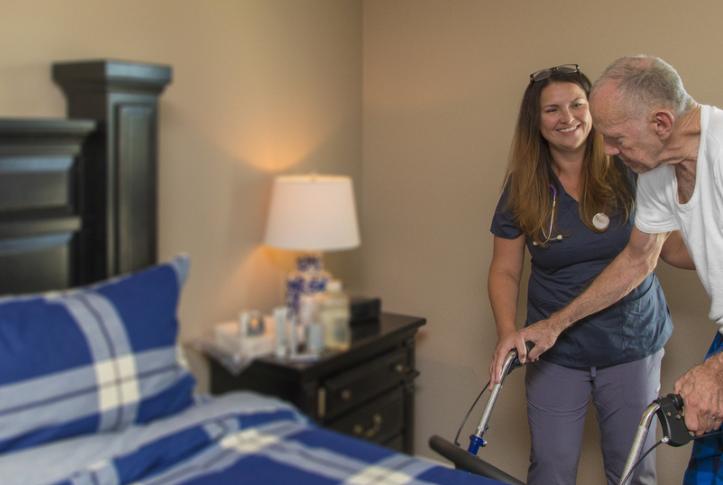Updated July 16, 2018
All Americans deserve compassionate care that honors their wishes as they become terminally ill. While hospice use has grown to meet their needs in recent years, Medicare limits hospice benefits to patients with a life expectancy of less than six months. But many patients need help earlier as they confront new symptoms as well as difficult life decisions, including whether and when to discontinue curative treatment — a requirement for the use of Medicare hospice benefits.
Advanced illness management programs seek to fill this gap by helping these patients manage their disease, clarify their goals, and work through delicate issues that primary care doctors and specialists may not have the time or expertise to handle. These community-based models of care delivery for people with serious illness seek to identify and engage patients early in their disease progression, offer them advance care planning, coordinate care across all settings, and provide a customized mix of curative and comfort care that evolves as illness advances so that patients can achieve the best possible quality of life.
In essence, these programs act as guides to patients and their family caregivers as they decide how they would like to live out their lives with dignity and grace — something that the current system often doesn’t offer. In addition to improving patients’ quality of life, the programs have demonstrated cost savings by helping patients avoid complications and unnecessary acute care. The potential impact of these programs has attracted the interest of officials at the Center for Medicare and Medicaid Innovation, who are working to develop a broader demonstration of the model. (A collection of short case studies on these programs is also available.)
Common Approaches
Regardless of their financing, advanced illness management programs share some approaches, which continue to evolve as they gain experience.
Interdisciplinary teams of nurses and social workers, supported by physicians and other staff, offer a high degree of responsiveness to patients’ evolving needs through in-person visits and/or telephonic support. They help patients and their caregivers manage medical conditions and medications while building trusting relationships.
More frequent communication with patients and a focus on their goals can facilitate timely transitions to hospice when patients are ready. The programs report longer lengths of stay in hospice than national averages, which can benefit patients and their caregivers. To facilitate better transitions, Aetna extends hospice benefits to its commercial health plan members with a 12-month life expectancy, and allows hospice to be used concurrently with curative care for these members. (Under current federal rules, Medicare Advantage health plan members must disenroll to access hospice benefits under traditional Medicare.)
Challenges
Identifying which patients could benefit the most from these programs can be tricky. Although programs typically employ data analytics, clinical judgment is also needed. Sutter Health trains staff across the system to identify and refer patients to the program, while Aetna encourages its contracted physicians to do so. Northwell Health embeds advanced illness management in a home-based primary care program, which facilitates a longitudinal understanding of patients’ trajectory and seamless transitions to the next stage of care.
It can sometimes be difficult to find clinical staff trained and willing to do this work, which inhibits the expansion of programs. In response, some programs are using community health workers and leveraging technology such as telemedicine for virtual visits to extend their reach.
Many health care regulations, clinical guidelines, and quality measures are oriented to curative treatment and the expectation it will lead to improved health outcomes. But most advanced illness patients aren’t going to improve. The National Committee for Quality Assurance and the National Home-Based Primary and Palliative Care Network are leading efforts to create new measures of the quality of serious illness care and of home-based primary and palliative care. Assessing quality from the perspective of patients and their family members can help to ensure appropriate and patient-centered care in these programs as well as in hospice.
Paying for Advanced Illness Management
Under capitated payment, health plans (including Medicare Advantage plans offered to Medicare beneficiaries) may have flexibility to offer programs such as advanced illness management as a covered benefit. As with other care management programs, advanced illness management can produce net savings through reduced hospital use that would allow the plan to offer a more competitive premium. Under Medicare Advantage payment rules, health plans must pass on savings from lower premiums in the form of extra benefits that are not offered under traditional Medicare. Congress has been considering changing Medicare rules to include hospice in the Medicare Advantage benefit package and capitation rate.
Fee-for-service payment does not fully support provider-led advanced illness management programs, since some home visits by non-physicians and other care management services are typically not reimbursed. Although health systems may save money from reducing the duration of hospital stays for some patients, most of the savings accrue to Medicare or other payers under fee-for-service reimbursement. The health systems we examined viewed their programs as a means to succeed in value-based payment arrangements, such as Medicare’s Independence at Home demonstration, which allow them to share in savings they achieve and thus realize a return on their investment in developing and operating their programs.
To help overcome financial disincentives for providers to offer advanced illness management services, an expert panel convened by the U.S. Department of Health and Human Services recently recommended that Medicare test alternative payment models developed by the Coalition to Transform Advanced Care and the American Academy of Hospice and Palliative Medicine. The cost to Medicare of longer hospice stays for patients in advanced illness management programs is likely to be offset by reduced spending on hospital stays.
There is also a need for broader public education and culture change among providers so that offering support for advanced illness management and end-of-life decision making becomes a routine expectation of care.
Acknowledgement: The authors thank Shawn Bishop, vice president for Controlling Health Care Costs and Advancing Medicare at the Commonwealth Fund, Brad Stuart, M.D., chief medical officer for the Coalition to Transform Advanced Care, and CEO of ACIStrategies, and Diane Meier, M.D., director, Center to Advance Palliative Care at Mount Sinai School of Medicine, for insight and comments on this topic.






